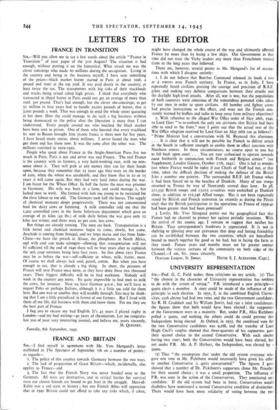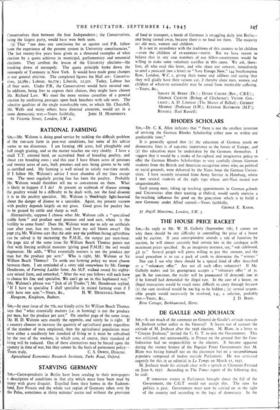UNIVERSITY REPRESENTATION SIR,--Prof. G. C. Field makes three criticisms on
my article. (I) That "the change in the character of University representation has nothing to do with the system of voting." P.R. introduced a new principle—a quota elects a member. A story could be made of the influence of this principle in each election. In 1931, if, in the combined English Univer- sities, each elector had had two votes and the two Government candidates, Sir R. H. Craddock and Sir William jowitt, had run a joint candidature, the figures show that both would have been elected ; the supporters of the Government were in a majority. But, under P.R., Miss Rathbone polled a quota, and nothing the others could do could prevent this Independent being elected At Oxford, in 1935, the combined vote for the two Conservative candidates was 9,168, and the transfer of Lord Hugh Cecil's surplus showed that three-quarters of his supporters gave their second choice to the second Conservative. With each elector having two votes, both the Conservatives would have been elected, but not under P.R. Mr. A. P. Herbert, the Independent, was elected by .1 quota.
(2) That "the assumption that under the old system everyone who gave one vote to Mr. Pickthorn would necessarily have given his other to another Conservative is quite unwarranted." The figures I gave showed that a number of Dr. Pickthom's supporters chose Mr. Priestley for their second choice ; it was a small proportion. The influence of P.R. was seen in the action of the Conservatives. They nominated one candidate. If the old system had been in force, Conservatives would doubtless have nominated a second Conservative candidate of distinction. There would have been more solidarity of voting between the two
Conservatives than between the four Independents ; the Conservatives, being the largest party, would have won both seats.
(3) That "nor does any conclusion for or against real P.R. follow from the experience of the present system in University constituencies." The last twenty -five years have given us a thousand examples of what election by a quota achieves in municipal, parliamentary and senatorial elections. They confirm the lesson of the University elections—the breaking down of monopoly. The quota principle broke down the monopoly of Tammany in New York. It would have made great changes in our general election. The completed figures for Hull are: Conserva- tives, 32,289; Labour, 60,779; Liberals, 12,321. Today, Labour has all four seats. Under P.R., the Conservatives would have secured one. In addition, being free to express their choices, they might have chosen Mr. Richard Law. We meet the more serious casualties of a general election by conferring peerages upon back benchers with safe seats. The :.elective qualities of the single transferable vote, to which Mr. Churchill, Mr. Wells and many others have directed attention, would act in a
more democratic way.—Yours faithfully, JOHN H. HUMPHREYS. 82 Victoria Street, London, S.W..t.



























 Previous page
Previous page